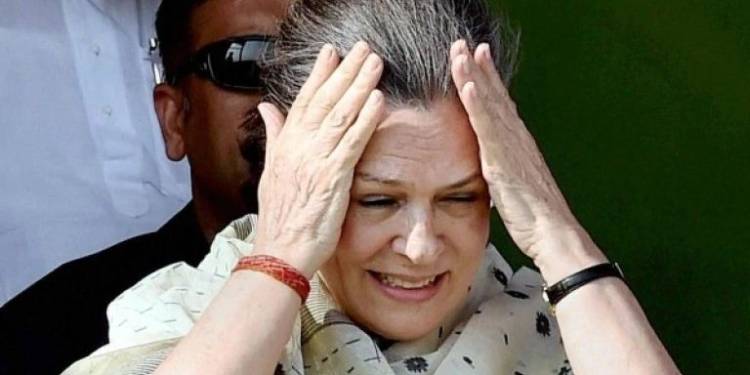As per recent reports, Congress President Sonia Gandhi has constituted a panel of party leaders for deliberation on important issues. The object is to equip the party to come out with reasoned and well-thought-out responses to the political and social moves of the Modi government. According to sources, the 21-member “committee on important issues”, will meet under the leadership of the party president Sonia Gandhi and will meet regularly or once a month for brainstorming. As per TOI, the party members claimed that it was an ‘informal committee’.
Among the upcoming issues that the Congress will have to deal with and that can potentially put the grand role party in a fix in the near future is the Ram Mandir dispute, on which the apex court is set to pronounce its judgment next month. Uniform Civil Code and the Citizenship Amendment Bill are other issues over which the Congress needs a well-thought-out strategy.
The party seems to have realised the need to forge a consensus on important issues within the party. The differences among the party leaders became apparent during the discussion around abrogation of Article 370 of the Constitution. While the party stand was opposed to the Modi government’s move, many party leaders came out speaking strongly in support of the move, defying their party’s controversial stand. And those who came out in support of the abrogation of Article 370 included some of the top party leaders showing dissensions within the party leadership itself. While Scindia and Janardan Dwivedi voiced support to the government’s move, former Haryana CM Bhupinder Singh Hooda went a step further and said, “When the government does something right, I always support it. Many of my colleagues opposed the Centre’s decision to abrogate Article 370. They have lost their way. It is not the same Congress as it used to be.”
Yet another issue plaguing the Congress under the leadership of Sonia Gandhi has been its growing image as an anti-nationalist political outfit. Recently, it was reported that the grand old party has decided to train its leaders “Nationalism” to stay relevant in a ‘Nationalist’ India. And this is exactly where the problem lies with the Congress. Nationalism is a natural sentiment and cannot be imbibed with any amount of training or brainstorming sessions. It concerns more with the party ideology than the political strategy. The ideology of the party has shaped it up like this, and especially after Sonia Gandhi took over the leadership of the party in mid-1998 and realigned it with the left to counter the BJP, whatever latent nationalistic sentiment was still left in the Congress also died down gradually.
In the present context, the grand old party has often found itself taking a controversial and untenable stand on many national issues which do not really resonate with the larger public sentiment. Take, for example, the Pulwama terror attacks and the Balakot airstrikes when 21 opposition parties had issued a joint statement making baseless allegations against the government. The statement which was read out by the Congress president Rahul Gandhi stated, “National security must transcend narrow political considerations. The leader observed that the Prime Minister has regrettably not convened an-all party meeting as the established practice in our democracy”.
Pakistan had found appropriate fodder in the joint statement of opposition parties led by the Congress and its foreign minister Shah Mehmood Qureshi had used the statement made by the Indian opposition. He said, “Today, the 21 Opposition parties in India have also told the BJP not to play politics on this matter. The Opposition parties of India have said that BJP is using the Pulwama attack for elections, they are politicising the matter.”
To be quoted again and again by the Pakistani media houses and political establishment is not the kind of publicity that would help the Congress regain any substantial popularity at a national level. However, in the recent past, its statements on key issues have time and again resonated with political outfits and media houses in Pakistan.
What has made matters worse for the Congress is the fact that its campaign strategy has failed to inspire much confidence. It has lost the kind of public connect that a political outfit needs in order to remain electorally relevant. Most of their Social Media campaigns usually end up backfiring. And even with an entire left-liberal ecosystem at its disposal, the Congress has not able to set narratives that could have captured the imagination of the voters. Before the Lok Sabha polls, the entire party machinery had come out making bizarre allegations into the Rafale deal without an iota of evidence. Such campaigns have only reduced the credibility of the grand old party. Moreover, the ‘Chowkidar Chor hai’ slogan that Rahul Gandhi used against PM Modi also backfired badly for Congress.
The Lok Sabha polls held earlier this year also proven that dynastic politics has no real relevance in the present era. In fact, a number of dynastic leaders, including the Gandhi Scion, lost from constituencies which were once seen as dynastic strongholds. This should send the warning bells ringing for Congress- a party whose bulk of leaders represent dynasties.
Congress is embroiled in deep crisis on account of the aforementioned reasons. The grand old party also realised the fact and that is why a committee on important issues is being set up. However, what the party needs is a complete structural and ideological overhaul if it wants to truly reinvent itself.



























